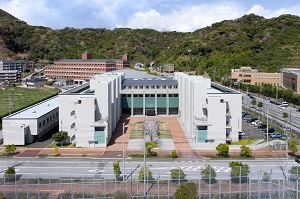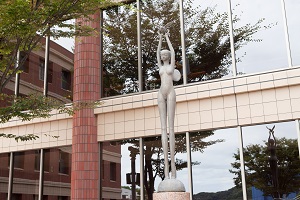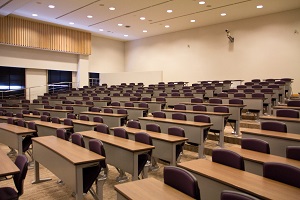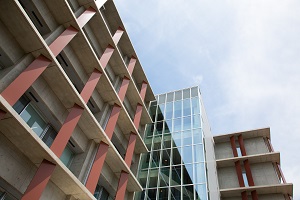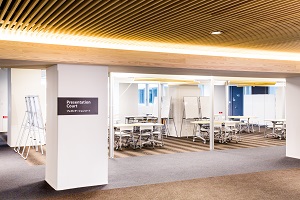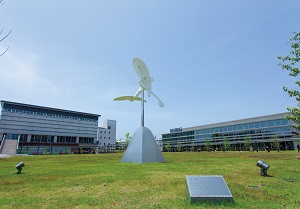| Faculty of Cultural Studies |
The Faculty of Cultural Studies awards bachelor’s degrees to students who have acquired knowledge of humanities and social sciences, and the skills to understand diverse society and culture, to pursue the realization of an affluent and harmonious society, the creation of new culture and pursuit of growth of autonomous self, and who have acquired each of the following abilities.
(Knowledge and understanding)
1. The student has acquired a wide educational base and a fundamental knowledge of humanities and social sciences, and is able to understand diverse cultures from various viewpoints.
2. The student is able to systematically understand specialized knowledge of humanities and social sciences centering around the areas of language and culture as well as the creation of communal culture, and has learned how to place that body of knowledge within his/her own critical mind.
(Ubiquitous and practical skills)
3. The student is able to collect extensive amounts of information necessary to solve problems, and is able to solve those problems through accurate organization and analysis.
(Attitude and orientation)
4. The student is able to take on various regional and international social issues actively and autonomously, working towards the realization of an affluent and harmonious society.
5. The student has a deep interest in society and culture, and is eager to continue learning and thinking throughout his/her life.
(Comprehensive learning experience and ability to think creatively)
6. The student is able to comprehensively put into use the knowledge, skills, attitude, etc. that he/she has learned up to now, and is able to contribute to the creation of new cultures with a free mind. He/she is also able to pursue his/her own individual endeavors, so as to grow as a person.
|
| Faculty of Nursing |
The Faculty of Nursing awards bachelor's degrees to the students who have gained abundant humanity and attitude to engage in social issues and the development of nursing for the future on the basis of nursing philosophy, expert knowledge and technology, and humanism, who seek to solve health problems collaboratively, who aim to acquire a rich humanity and creativity that can contribute to the creation of people's healthy lives, and who have acquired the following abilities.
(Knowledge and understanding)
1. The student has the skills to put nursing into practice in various areas of study such as public health, medical care, welfare, etc. on the basis of specialized knowledge, skills, scientific logicality and logical decisions.
(Ubiquitous and practical skills)
2. The student understands the diverse ways in which humans live their lives and their value systems, respects sanctity and rights, and is able to build relationships with others through good communication.
3. The student is able to predict health issues in communities and is able to exercise leadership in solving health issues by working together with professionals from multiple disciplines.
(Attitude and orientation)
4. The student has cultivated his/her identity as a nursing specialist and has the skills to continue improving their expertise throughout his/her life.
(Comprehensive learning experience and ability to think creatively)
5. The student has the fundamental ability to conduct research that leads to improving the quality of nursing.
6. The student has the skills to understand nursing studies from an international and interdisciplinary standpoint.
7. The student has the fundamental skills to make use of his/her nursing specialty to improve the health of local people and create a safe and secure society.
|
| Faculty of Social Welfare |
The Faculty of Social Welfare awards bachelor’s degrees to the students who, striving for the values, knowledge, and skills necessary for social welfare professionals aiming for a harmonious society, have acquired each of the following qualities.
(Knowledge and understanding)
1. The student is able to systematically understand specialized knowledge on social welfare, on the basis of extensive education upon which to the needs of people living in current society.
2. The student understands people’s lives from both human and environmental perspectives, and has acquired the practical knowledge to deal with issues concerning on the circumstances of individuals as well as those concerning social welfare in general.
(Ubiquitous and practical skills)
3. The student is able to grasp ever-diversifying and complicated welfare needs from a scientific viewpoint, and is able to understand the challenges of individuals in terms of their relationships to the society.
4. The student is able to exert communication skills in collecting and analyzing information necessary to solve welfare issues and examine the information in a logical way and from a number of angles whereby he/she can propose plans for tackling those issues.
(Attitude and orientation)
5. The student is aware of himself/herself as a member of society and is able to contribute to the peacefulness and quality of people’s lives while exercising appropriate use of his/her responsibilities and rights.
6. The student has gained the aspiration to independently deal with welfare issues in terms of human rights and social justice on the basis of the notion of normalization as his/her principal viewpoint.
(Comprehensive learning experience and creative thinking)
7. The student respects the sanctity of individuals and principles of welfare, and is able to creatively and scientifically develop towards the defending rights.
8. The student has a comprehensive outlook, and is able to pursue self-growth as a professional by putting social welfare into practice in collaboration with other professionals in such disciplines as public health, healthcare, and social welfare.
|
| Faculty of Nutrition |
We aim for the students to acquire both affluent education and attitudes to engage themselves with various social issues, to investigate food, i.e. the source of life, striving to understand the true nature of humans and health, thereby being able to contribute to people living healthy lives. The bachelor’s degree is awarded to the students who have acquired each of the following abilities.
(Knowledge and understanding)
1. The student, cultivated through a wide range of disciplines, is able to understand various issues in current globalizing society and special characteristics of communities therein.
2. The student has acquired the nutritionist-specific knowledge, skills, and learning methods for maintaining and improving health as well as preventing and curing injuries and illness.
(Ubiquitous and practical skills)
3. The student is able to collect, analyze, and organize the information required to solve various issues surrounding communities and thereby make suggestions for those issues.
4. The student has acquired a comprehensive set of qualities required of a national registered dietitian, including knowledge, skills, attitude, and ways of thinking.
(Attitude and orientation)
5. The student, as a specialist in nutrition and diet, shows aspiration to raise the level of his/her knowledge and skills throughout his/her life.
(Comprehensive learning experience and ability to think creatively)
6. The student understands public health and thereby is able to manage nutrition and meal provision services in the public health, medical care, welfare, and nursing-care systems.
7. The student is able to provide guidance on nutrition and diet for health promotion and for the primary, secondary, and tertiary prevention of disease.
|

